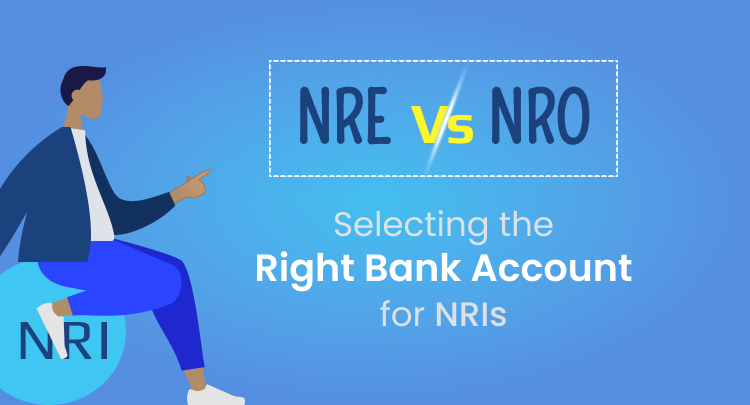Category
NRI INVESTMENT
Investing in India as a Non-Resident Indian (NRI) can be a lucrative opportunity, but it comes with its own set of challenges and questions. One of the most common dilemmas NRIs face is choosing between a Non-Resident External (NRE) account and a Non-Resident Ordinary (NRO) account. Both accounts offer unique benefits, and understanding these can help you make an informed decision. This blog will explore the key differences, benefits, and considerations to help you decide which account is better based on your needs.
#### **Understanding NRE and NRO Accounts**
**NRE Account:** A Non-Resident External (NRE) account is an Indian rupee-denominated account that allows NRIs to transfer foreign earnings to India. The principal amount and the interest earned are fully repatriable, meaning they can be transferred back to your country of residence without any restrictions. The interest earned on an NRE account is tax-free in India.
**NRO Account:** A Non-Resident Ordinary (NRO) account is also an Indian rupee-denominated account but is primarily used to manage income earned in India, such as rent, dividends, or pension. Unlike the NRE account, the interest earned on an NRO account is subject to Indian income tax, and repatriation of funds is subject to certain limits and regulations.
#### **Key Differences Between NRE and NRO Accounts**
#### **1. Repatriation of Funds:**
**NRE Account:** Allows full repatriation of both principal and interest.
**NRO Account:** Permits repatriation of interest but limits repatriation of the principal amount to $1 million per financial year with proper documentation and compliance with regulations.
#### **2. Taxation:**
**NRE Account:** Interest earned is tax-free in India.
**NRO Account:** Interest earned is subject to a 30% tax rate, plus applicable surcharge and cess.
#### **3. Deposit Source:**
**NRE Account:** Funds must come from abroad.
**NRO Account:** Can include income earned in India or transfers from other NRO accounts.
Benefits of NRE and NRO Accounts for Investment
#### **NRE Account:**
**Tax-Free Returns:** The tax-free interest is a significant advantage, allowing your investment to grow without the burden of Indian taxes.
**Easy Repatriation:** This means you can transfer your money back to your resident country without any hassle.
Hedging Against Currency Risk: Since the account is maintained in Indian rupees, it provides a hedge against currency fluctuation for those looking to invest in Indian markets.
#### **NRO Account:**
**Managing Indian Income:** Ideal for NRIs who have income sources in India, such as rental income, dividends, or pensions.
**Joint Account Facility:** NRO accounts can be held jointly with residents, which can be convenient for managing family finances in India.
**Flexibility in Deposits:** Accepts deposits from both Indian and foreign sources, offering more flexibility in managing funds.
Which is Better?
The choice between an NRE and NRO account depends on your specific financial goals and needs.
**Choose NRE Account If:**
* You primarily earn and want to invest foreign income in India.
* You are looking for tax-free interest earnings.
* You want the flexibility to repatriate your money freely.
**Choose NRO Account If:**
* You have income sources in India you need to manage.
* You are okay with paying taxes on the interest earned.
* You do not require full repatriation of funds, or you need to manage local expenses in India.
Read More →
Category
NRI INVESTMENT
India offers a plethora of investment opportunities for Non-Resident Indians (NRIs) looking to grow their wealth. From traditional avenues like fixed deposits to modern options like mutual funds and real estate, NRIs can find diverse ways to invest their money. This guide will walk you through some of the best investment options in India tailored for NRIs.
**1. Fixed Deposits (FDs)**
Fixed Deposits are one of the safest and most popular investment options among NRIs. They offer guaranteed returns and are relatively risk-free. NRIs can open NRE (Non-Resident External) or NRO (Non-Resident Ordinary) fixed deposits.
**NRE Fixed Deposits:** These deposits allow NRIs to invest their foreign income in Indian rupees. The principal and interest earned are fully repatriable and tax-free.
**NRO Fixed Deposits:** These are suitable for NRIs who have income originating in India, such as rent or dividends. The interest earned is subject to TDS (Tax Deducted at Source), but the principal amount is fully repatriable.
**2. Mutual Funds**
Mutual funds are an excellent investment option for NRIs looking for diversified and professionally managed portfolios. They can choose from equity, debt, or hybrid mutual funds based on their risk appetite and investment goals.
**Equity Mutual Funds:** Ideal for NRIs with a higher risk tolerance, these funds invest in stocks of Indian companies, offering the potential for higher returns.
**Debt Mutual Funds:** These funds invest in fixed-income securities like government and corporate bonds, providing stable returns with lower risk.
**Hybrid Mutual Funds:** Combining both equity and debt, these funds offer a balanced approach, suitable for moderate risk-takers.
**3. National Pension System (NPS)**
The National Pension System is a long-term retirement-focused investment option. NRIs can open an NPS account and contribute regularly to build a retirement corpus.
**Tier I Account:** This is the primary pension account with restricted withdrawals until retirement. Contributions are eligible for tax deductions under Section 80C of the Income Tax Act.
**Tier II Account:** This is a voluntary savings account with no withdrawal restrictions but does not offer tax benefits.
**4. Direct Equity**
NRIs can invest directly in the Indian stock market through Portfolio Investment Scheme (PIS) accounts. This allows them to buy and sell shares of Indian companies.
**Stock Market Investments:** NRIs can invest in blue-chip stocks, mid-cap, and small-cap stocks based on their risk tolerance and investment strategy.
Regulations: They must adhere to the guidelines set by the Reserve Bank of India (RBI) and the Securities and Exchange Board of India (SEBI).
**5. Public Provident Fund (PPF)**
The Public Provident Fund is a long-term investment option with a tenure of 15 years, offering attractive interest rates and tax benefits.
**Tax Benefits:** Investments in PPF are eligible for tax deductions under Section 80C, and the interest earned is tax-free.
**Safety:** Backed by the government, PPF is a safe investment option with guaranteed returns.
Please note that NRIs cannot open a new PPF account. However, they can continue investing in the existing PPF account.
**6. Bonds and Non-Convertible Debentures (NCDs)**
NRIs can invest in government and corporate bonds, as well as non-convertible debentures, which offer fixed interest rates and are relatively low-risk investments.
**Government Bonds:** These are issued by the government and are considered one of the safest investment options.
**Corporate Bonds and NCDs:** Issued by companies, these offer higher interest rates compared to government bonds but come with slightly higher risk.
Investing in India offers NRIs a variety of options to grow their wealth. It's essential to consider factors such as risk tolerance, investment horizon, and tax implications before making any investment decisions. Consulting with financial advisors can also provide valuable insights tailored to individual financial goals.
With careful planning and strategic investments, NRIs can make the most of the opportunities available in the Indian market.
Read More →





